“They hanged her husband. He had not harmed anyone. They made an example of him for stealing a few bags of cement. She buried him the same night. The fighting was drawing near. Who knows how long she would have had to wait otherwise. Just before dawn, two soldiers entered her house. Unaware of what had happened, they ordered the young widow to hitch up the horses and drive them to the Austrian border. She saw this as a sign from God, and prayed for strength to carry out her act of just vengeance without hesitation.”
So reads the portentous post-title text crawl that sets up director Karel Kachyňa’s riveting 1966 World War 2 drama, Kočár do Vídně, which here is translated as Coach to Vienna but has previously been shown under the English title of Carriage to Vienna. The situation and potential direction that the story will take is then underlined with gorgeous cinematic economy by the first few shots of the film. As it begins, the camera is located in the rear of the carriage (for clarity, the carriage in question is one I’d normally describe as a horse-drawn cart) facing forwards as it travels down a forest roadway. Sitting at the reins with her back to us is the above-mentioned woman – named Krista (Iva Janžurová) in the credits, but not in the film itself – who is shrouded in a black coat and headscarf, a traditional costume of mourning that also casts her as a potential angel of death. Walking ahead and occasionally glancing back is Hans (Jaromír Hanzlík), the younger of the two soldiers who have commandeered her and her horses. When Krista turns slowly round to look behind her at the older second soldier, Günther (Luděk Munzar), who is lying on a bed of hay and staring vacantly into space, her expression is one of stony distaste. Without saying anything, Günther weakly leans over the side of the carriage and vomits, then he flops onto his back in a manner that confirms he is either deeply unwell or seriously injured. Krista then slowly shifts her gaze instead to the walking figure of Hans, who is complete focussed on the job in hand. The expression on Krista’s face at this point is one of barely concealed loathing. As her eyes switch to looking at the road ahead, she seems to be lost in thought, as if contemplating her next move. It’s then that we’re shown the underside of the carriage, where a fearsome-looking axe is stowed between the rear wheels. The basics of the setup for the story have been clearly communicated in the space of just 40 seconds, through six purposefully framed shots and without a single word of dialogue. I – and this is no exaggeration – was already riveted.
And then…
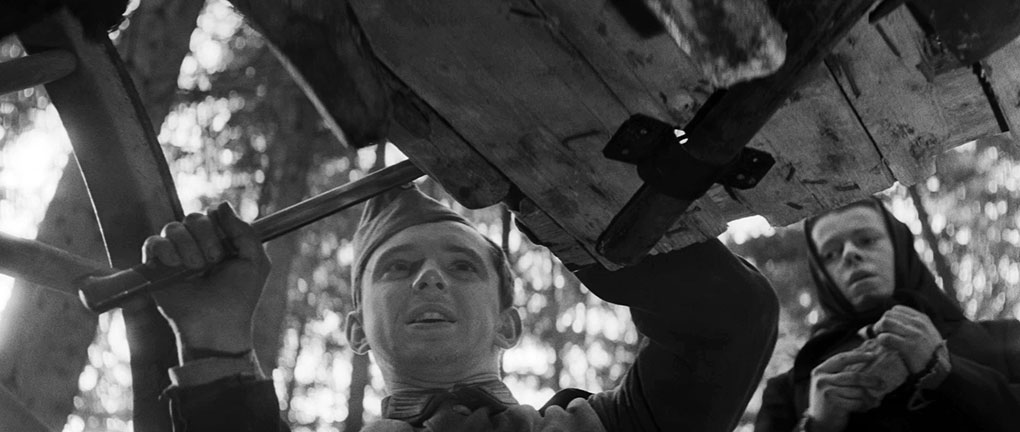
Well, here’s the thing. For anyone coming to Carriage to Vienna with little or no knowledge about how it plays out, the above really is all you need to know – and indeed should ideally know – about how the story unfolds in advance. I could thus round things off here with a brief appreciation of the film’s considerable merits and move on to the technical specs and special features, but, as ever, I can’t just leave it at that. Thus, if you would prefer to go into the film completely cold as I did on my first viewing, then seriously consider skipping the next six paragraphs (click hereto do so automatically) and go straight to the part of this review where I talk about why Carriage to Vienna may well be the finest film I’ve watched so far this year.
The entire film takes place over the course of a journey over what looks like a 24-hour period. The date is never specified, and while it could be set at any time during the later stages of the war, there’s a case to be made for suggesting that it takes place on the 8th or 9th of May, 1945. If that date means nothing, check your history books or your world events calendar. Germany surrendered unconditionally on 7th May, two days after the beginning of what became known as the Prague Uprising, which ended in a ceasefire on the 8th, a day before the arrival of Soviet troops and one of celebration across Europe that has since been marked as VE (Victory in Europe) Day. Exactly why the exact date seems to matter will become clear in a couple of paragraphs’ time.
What quickly intrigues, and what apparently rankled the authorities and helped to get it banned after the Soviet invasion of Czechoslovakia in 1968, is the decision of writer-director Karel Kachyňa and his friend and co-screenwriter Vojtěch Jasný to kick against long-standing tradition and present the German soldiers in a sympathetic light. The young Hans is quickly established as a personable and optimistic Austrian who no longer believes in a war that he may well have been conscripted to fight in, and who now just wants to get home to his family but cannot stomach the thought of abandoning his wounded comrade. It thus seems clear that the commandeering of Krista and her carriage is an act of desperation that he wouldn’t have contemplated if he was travelling alone. Real tension thus arises from the knowledge that the vengeful Krista has no interest in the pictures of his family that the eager Hans tries to show her, and is simply waiting for the right moment to grab that secreted axe and bury it in the young man’s head.
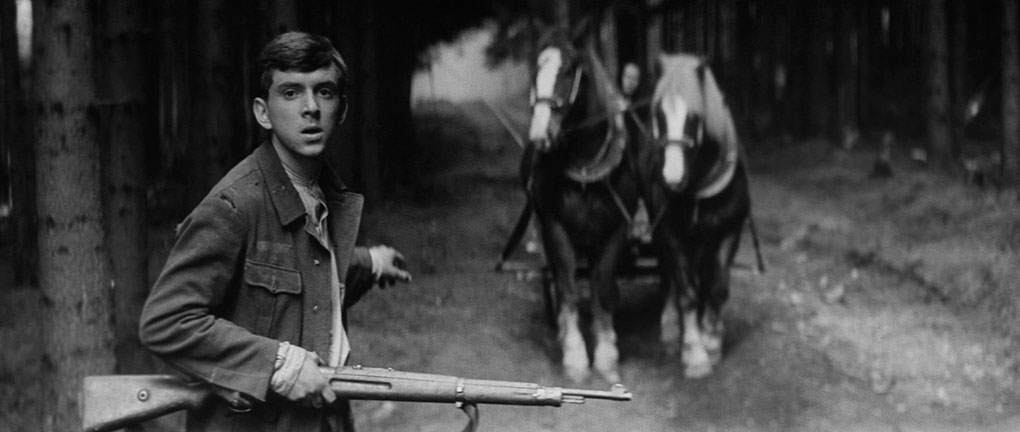
Complicating things further is our natural allegiance with grievously wronged Krista, who is effectively being forced at gunpoint to assist members of an occupying army that murdered her husband just a few hours earlier. As she uses every forced pause in their journey to even out the odds by quietly disposing of the soldiers’ weapons – which are left hanging from trees or embedded in the bark like perversely destructive fruit – the fear that her distracted captors will realise what she is up to and enact a violent reprisal is very real. The almost innocent Hans seems oblivious to the bottled-up hatred we can clearly see in Krista’s every look and expression, something only the injured and innately distrustful Günther appears to be picking up on.
Adding to the tension is the language and communication barrier. As the affable Hans prattles cheerfully on to Krista in German, he seems only superficially aware that she cannot understand a word that he says. In response, Krista stonily refuses to utter a word, her only verbal communication being a rolling “Brrrrr!” that she utters to bring her horses to a halt. As the story progresses, however, it seems increasingly likely that she understands much of what is being said and has chosen not to reveal this, a strategic move that gives her a tactical advantage but that is also an expression of her contempt for her captors.
While it may seem that there is an air of inevitability to some aspects of the story, none of these elements play out in the expected manner, and thus I see no good reason to discuss specifics here. Structurally, the film is consistent compelling, always character driven and largely unpredictable, a true masterclass in three-handed storytelling that never wastes a second of its carefully crafted 78-minute runtime. It makes atmospheric use of its forest road location, whose unbending trajectory is constantly shrouded in mist (I did wonder if this occurred naturally or was created for the film), and whose trees offer hiding places for watching eyes, and can force Hans and even a reluctant Krista to improvise when inconveniently felled.
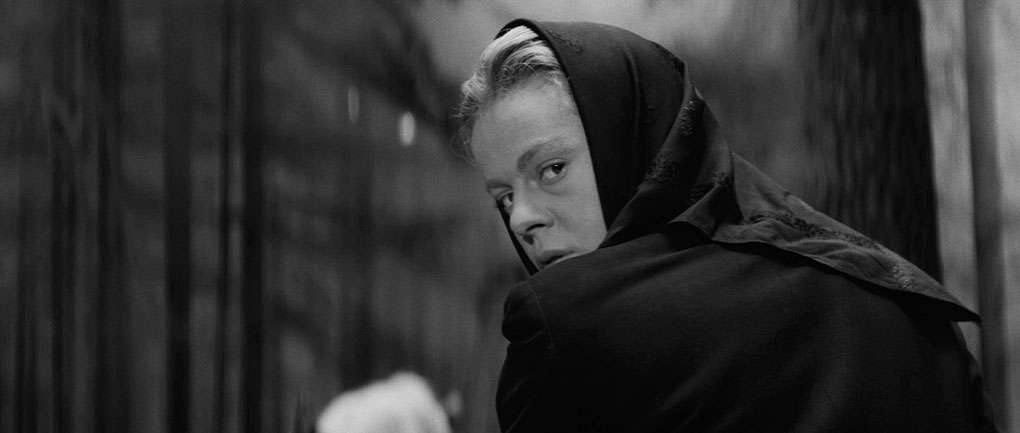
There is one moment that I do feel the need to discuss in more detail, primarily because of comments made about it on the commentary track on this disc. At one point in their journey, Hans hears the sound of church bells and reacts with barely concealed delight, taking it as a sign that the war is finally over. On the commentary, the plausibility of this is called into question, his reaction eventually passed off as nothing more than wishful thinking. I beg to differ. There are a couple of points to consider here, and I’ll freely admit that they do depend partly on my earlier supposition about when the film is set. During the Second World War, the ringing of church bells was curtailed and reserved as a warning to alert the local populace of invasion. The German army also confiscated church bells in occupied lands to melt down and shape into weapons of war, and it would thus have been just a little reckless to do anything to alert the Germans to the presence of any bells they might have missed. Historical reports also indicate that ordinary German foot soldiers were aware that the war was going badly for them long before the final defeat, and in its final days, fear of reprisals from the advancing Red Army or local partisans – Hans at one point urgently asks Krista if partisans are active in this region – may well have prompted some of them to abandon their posts and flee for home, as Hans is attempting to do with his seriously wounded comrade in tow. Thus, if the film is indeed set on the final day of the war, Hans would by this point be acutely aware that Germany is facing imminent defeat, and that the war in Europe is coming to an end. Combine this with the sound of church bells ringing – something that hasn’t been heard in Europe in years – and I have no trouble at all with the idea that he would immediately jump to this hopeful conclusion.
The performances of the three leads are impeccable, particularly Iva Janžurová as Krista, who communicates more through wordless expressions than many actors can with reams of even well-written dialogue. As Hans, Czech actor Jaromír Hanzlík’s German pronunciation sounds so perfect to my admittedly non-German ears that I became convinced that he was either fluent in the language or was of direct German descent. The boyish enthusiasm he brings to the character makes Hans disarmingly likeable, and prompted me at one point to start hoping against hope that he might get to see his homeland again, despite the pall that hangs over the characters from an early stage. And while Luděk Munzar may have less to do as the seriously injured Günther, he convinces completely in his portrayal of the character’s pain, disorientation and desperation, and his distrust of a woman he does not have the strength to defend himself against should she turn on him.
There is no ‘gotcha!’ moment in Coach to Vienna, no one scene that dazzles in its filmmaking or its story twists, but as a complete work it really knocked me for six. Kachyňa and Procházka (whose superb 1990 The Ear was released on Blu-ray by Second Run in 2019) take a primarily visual approach to a story in which spoken words tell you even more about the person delivering them than they do about their situation or intent. They are well served here by regular collaborator Josef Illík’s handsomely composed but never showy monochrome scope cinematography, and Miroslav Hájek’s waste-free and purposeful editing. Infusing the intimate drama with a sense of something grander, meanwhile, is Jan Novák’s full-blooded but melancholically toned orchestral score, which is diligently employed to heighten the emotion of key scenes without ever overpowering them, while others play out more effectively with no musical accompaniment at all.
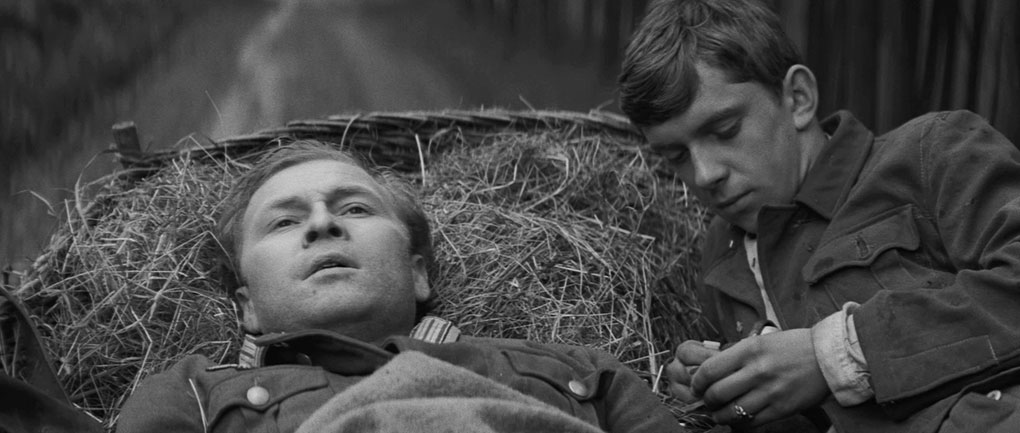
It all builds to an emotionally punishing finale, and an ending that is open to two very different interpretations that would be just too much of a spoiler to get into here – I may well address this in a separate blog post instead, making it easier for those who have not seen the film to avoid until they have. And see it you should. So many great works were made (and often then buried) during this extraordinarily fertile period for Czech cinema, and as Coach to Vienna profoundly demonstrates, there are clearly more waiting to be restored and rediscovered than those already celebrated titles that we have become more familiar with in recent years. Even by the high standards already set by the Czech New Wave, this a beautifully handled and movingly pacifistic work, one that, for this humble viewer at least, doesn’t have a single wrong note or even remotely superfluous purely decorative component.
Sourced from a new 4K restoration by the Czech National Film Archive, which was created from the film’s original image and sound negative, the 2.35:1, 1080p transfer on Second Run’s Blu-ray is seriously impressive, capturing the tree-shrouded gloom of the journey but still boasting a well-balanced contrast range with rock-solid black levels, and an excellent level of picture detail. Any former traces of wear or dust have been scrupulously removed, and there’s not a trace of any movement of the image within the frame. A first-rate job.
The Linear PCM 1.0 mono soundtrack, whose dialogue is a mixture of Czech and German, has some expected, age-specific restrictions in its dynamic range, something particularly evident in the music score, but is otherwise clear, and some of the sound effects (to get into specifics might act as a spoiler) have a clarity that belies the film’s vintage.
English subtitles kick in by default, but can be switched off either on the main menu or using the remote whilst the film is playing.
Projection Booth commentary with Samm Deighan, Kat Ellinger and Mike White
One of our favourite commentary teams turns its collective attention to a film that all three contributors praise as one of the overlooked gems of the Czech New Wave. They note that the film was not widely seen even on its initial release and was ultimately buried, suggest the possible influence of works like Jean-Pierre Melville’s Le Silence de la Mer (1949), Axel von Ambesser’s The Good Soldier Schweik (1960) and Jan Nemec’s Diamonds of the Night, and cite several similarities to Frantisek Vlácil’s later Marketa Lazarova (1967). They praise the work of lead actor Iva Janzurová, cinematographer Josef Illík, and costume designer Ester Krumbachová, and discuss the role of language in the film, the gothic and almost noir tone of some sequences, the subversiveness of portraying German soldiers sympathetically, and a whole lot more. An essential listen.
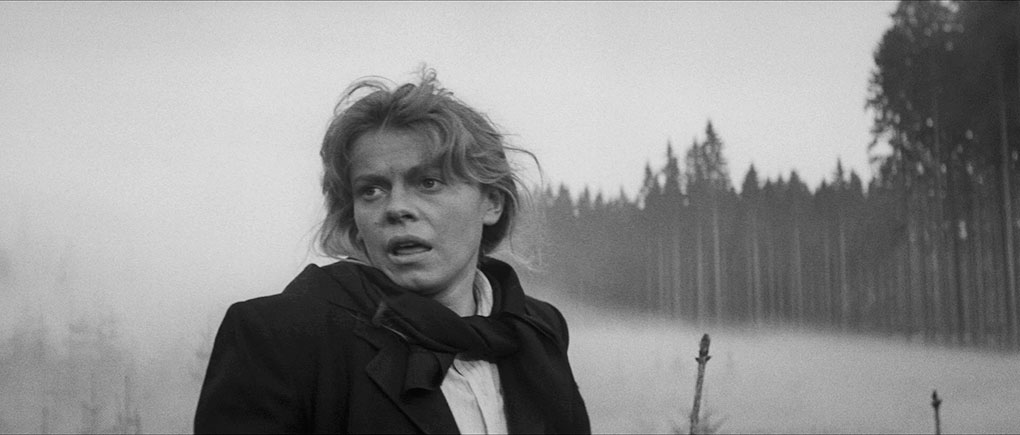
It’s Not Always Cloudy (Není stale zamračeno) (68:15)
Announced in the opening titles as ‘Presented by Czechoslovak State Film and made by students of the Academy of Performing Arts in Prague’, the 1950 It’s Not Always Cloudy was the Prague film school (FAMU) graduation film by Carriage to Vienna screenwriter Vojtěch Jasný and director Karel Kachyňa, who here share the director, camera and editor credits (they also wrote the screenplay with František Daniel). In essence, it’s a feature-length hymn to the benefits of the country’s collective approach to farming in the years following the Second World War.
Set in the summer of 1946 in the sparsely populated mountain village of Moldava, the principal character is Václac Pavelka, a 31 year-old from the distant town of Podebrady, where his patient wife and young daughter continue to reside. He’s been appointed to become the economic administrator of the dilapidated state farm around which the now almost deserted village was originally built. He comes armed with the knowledge that the clearly monumental task of reviving the farm prompted the first administrator to flee and his immediate predecessor to lose his mind. He is further disheartened on his arrival by the complete lack of encouragement offered by the local Commissioner, and the sight of ten cows that died due to the carelessness of two of the 30 volunteers that have signed up to help him. But we know from the moment he arrives that Václac will battle on anyway, and that he will ultimately beat the odds and restore the farm to its former glory. Kitchen sink social realism this is not.
Having said that, Jasný and Kachyňa do take a largely docudrama approach to their subject matter. Working with and around what were likely severe budget and equipment limitations, the film was shot silent and its soundtrack is driven primarily by voice-over, with assistance from, the occasional sound effect and a full orchestral score. The introductory third-person narration soon gives way to Václac’s internal monologue, and observed conversations that are vocalised by one of three narrators, with no attempt made to synchronise his or her words to what is being said on screen. This is not an issue, in part because the complete mismatch of sound and picture during clearly informs us that this was a deliberate move, but also because this technique was common in silent-shot documentaries of the day. As the film progresses, other characters also get to express their feelings through narrated internal monologues, including one of a new batch of workers when the going gets tough, Václac’s wife after she and their daughter move to Moldava, and even at one point the corrupt Commissioner.
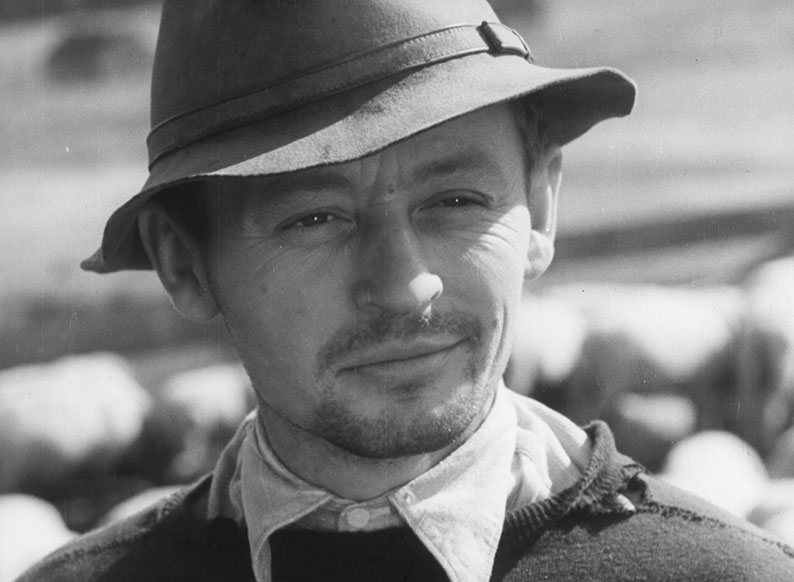
We’re given bad guys to repeatedly boo and hiss at in the shape of the Commissioner and his assistant, neither of whom are ever shown doing a lick of work and who instead spend their days playing cards or fishing. They even skim off some of the timber supplies that have been earmarked for the farm, and are as arrogantly brazen about their criminality as our current prime minister and his cronies are about theirs. A ray of hope is provided by the arrival of a government inspector after Václac files an official complaint, but he turns out to be as corrupt as the crooks he has been tasked to investigate. The evils of capitalism also roll up in the shape of a local shepherd and his assistant, who attempt to extort Václac for more than he can afford, and at one point just hang around to watch him struggling whilst wearing expressions of almost comically villainous smugness. Now why does this still feel so relevant?
Considering its purpose and the theoretically straightforward arc of its story, the film does feel a little overlong at times, and having already watched Václac overcome or fall victim to a number of challenges, by the halfway mark I did wonder what fate could still have up its sleeve for the poor man. That said, it’s never boring, is sometimes strikingly shot in the Soviet propagandist manner by its two directors, and it's hard not to be swept along by its triumphant final montage. It was also educational enough to have me researching another aspect of post-war Czechoslovakia about when I had previously known next to nothing.
The film does appear to have been restored – some shots are genuinely sparkling – but quite a few dust spots and scratches remain.
Trailer (1:37)
A 2020 trailer for Coach to Vienna promoting its restoration and doing a decent job of outlining the basics of the plot in only a few shots.
Image Gallery
29 screens of rare Hungarian lobby cards, which can either be advanced manually using the remote control or left to do so automatically.
Booklet
The meat of this booklet is a compellingly detailed and thoroughly researched essay on the film by Jonathan Owen, whose analysis includes a breakdown of the opening scene that I was so initially hooked by, and an examination of the careers of screenwriter Vojtěch Jasný and director Karel Kachyňa. An essential read, though only after you’ve watched the film, as there are major spoilers here. Main credits for the film have also been included.
I’ve mentioned before that I was a latecomer to the works of the Czech New Wave, but this does mean that I’m still being repeatedly knocked for six by films I’ve previously never even heard of. Coach to Vienna is just such a work, one that takes a seemingly simple premise and transforms it into a compelling and multi-layered story, one whose every beat and nuance of performance is close to pitch-perfect without ever for a second feeling overstated. Second Run has once again done the film proud, with a top-notch transfer, a superb commentary and booklet essay, and the inclusion of the director and screenwriter’s FAMU graduate film. Very highly recommended.
|